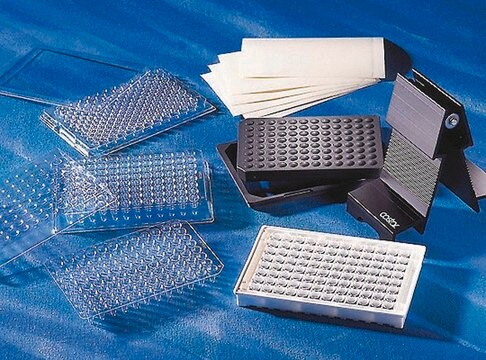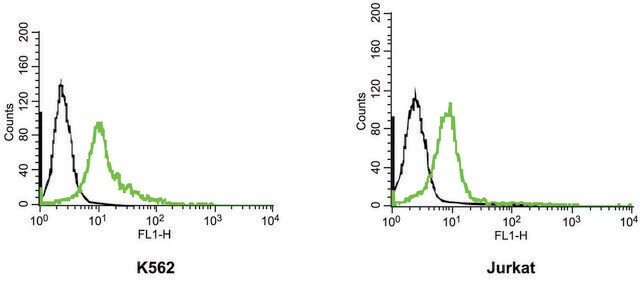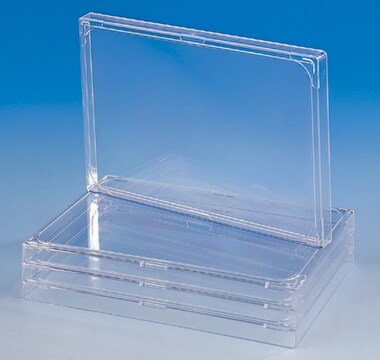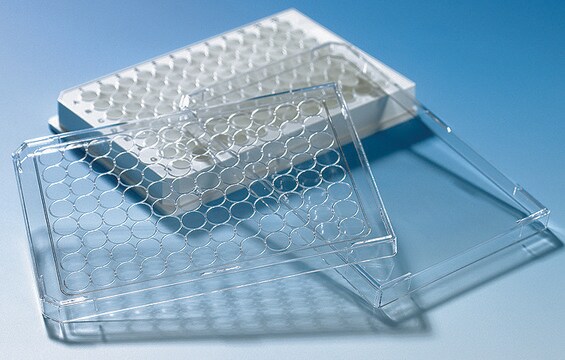CYL4039
PrecisION® hERG ion channel membrane preparation
Human ERG ion channel membrane preparation for Radioligand binding Assays.
Sinonimo/i:
Ion Channel Membrane Kit, hERG Channel Membrane Prep
Autenticatiper visualizzare i prezzi riservati alla tua organizzazione & contrattuali
About This Item
Codice UNSPSC:
41106514
eCl@ss:
32011203
NACRES:
NA.41
Prodotti consigliati
Descrizione generale
Human ERG
The human ether-a-go-go related gene (hERG) is a potassium ion channel which is essential for normal cardiac repolarization. In drug screening models, the hERG K+ channel has been indicated to inhibit a wide variety of compounds, and its blockage can lead to cardiac QT interval prolongation and life threatening arrhythmias (Murphy et al. 2006). Cardiac safety relating to IKr K+ channels has become a major concern of regulatory agencies, as hERG channel inhibition has been identified as the firmest link to QT prolongation (Chiu et al. 2004). Millipore′s hERG membrane preparations are crude membrane preparations made from HEK293 stable recombinant cell lines (Millipore cat. # CYL3039), which are ideal HTS tools for screening antagonists against the hERG channel. The membrane preparations exhibit a Kd of 5.2 nM for [3H]-Astemizole. With 10 μg/well hERG Membrane Prep and 3.0 nM [3H]-Astemizole, a greater than 4-fold signal-to-background ratio was obtained.
Descrizione della linea cellulare
GPCR Cell Lines
Applicazioni
Radioligand binding assay
Azioni biochim/fisiol
Protein Target: hERG
Target Sub-Family: Potassium
Qualità
Table 1. Signal: background and specific binding values obtained in a competition binding assay for the hERG membrane prep.
SPECIFICATIONS: 1 unit = 10 μg membrane preparation with [3H]-astemizole
Bmax with [3H]-astemizole: 6.7 pmol/mg
Kd for [3H]-astemizole: 5.2 nM
Table 2. Rank order comparison of various small molecule hERG inhibitors using [3H]-astemizole binding assay and E-Phys assays:
*Data obtained from Chiu et al., 2004
| 10 µg/well | |
|---|---|
| Signal:Background | 4.6 |
| Specific Binding (cpm) | 435 |
SPECIFICATIONS: 1 unit = 10 μg membrane preparation with [3H]-astemizole
Bmax with [3H]-astemizole: 6.7 pmol/mg
Kd for [3H]-astemizole: 5.2 nM
Table 2. Rank order comparison of various small molecule hERG inhibitors using [3H]-astemizole binding assay and E-Phys assays:
| Binding Ki (nM) with hERG membrane preps | Electrophysiology IC50 (nM) with hERG cell lines | ||||
| Millipore CYL4039M | Literature value* | Millipore CYL4039 by IonWorks PPC | Millipore CYL4039 by PatchExpress | Literature value by Patch Clamp | |
| Astemizole | 3.4 ± 0.7 | 3.3 ± 0.7 | 4.6 ± 0.003 | ND | 0.5 |
| Dofetilide | 5.8 ± 2.4 | 28 ± 6 | ND | ND | 15.3 ± 2.5 |
| E-4031 | 6.1 ± 0.8 | 58 ± 5 | 115 ± 0.02 | 144 ± 44 | 14 |
| Pimozide | 18.8 ± 2.3 | 14 ± 4 | ND | ND | 18 |
| Cisapride | 104.9 ± 30.9 | 123 ± 25 | 75.6 ± 0.02 | 5 ± 1 | 44.5 ± 10.6 |
| Haloperidol | 241.4 ± 21.4 | 234 ± 20 | ND | ND | 63 |
| Risperidone | >4000 | 4302 ± 319 | ND | ND | 167 |
| Verapimil | >4000 | 3902 ± 529 | 1332 ± 120 | 3100 ± 400 | 830 |
*Data obtained from Chiu et al., 2004
Specifiche
Inucbation Conditions
RECOMMENDED ASSAY CONDITIONS: Membranes are mixed with radioactive ligand and unlabeled competitor (see Figures 1 and 2 for concentrations tested) in binding buffer in a nonbinding 96-well plate, and incubated for 1-2 h. Prior to filtration, an FB 96-well harvest plate (Millipore cat. # MAHF B1H) is coated with 0.33% polyethyleneimine for 30 min, then washed with 25 mM Tris, pH 7.4, 130 mM NaCl, 5 mM KCl, 0.8 mM CaCl2, 0.1% BSA. Binding reaction is transferred to the filter plate, and washed 6 times (250μL per well per wash) with Wash Buffer. The plate is dried and counted.
Binding buffer: 10 mM Hepes, pH 7.4, 130 mM NaCl, 5 mM KCl, 0.8 mM MgCl2, 1 mM NaEGTA, 10 mM glucose, 0.1% BSA, filtered and stored at 4°C
Radioligand: [3H]-Astemizole (Perkin Elmer # NET-1140)
Wash Buffer: 25 mM Tris, pH 7.4, 130 mM NaCl, 5 mM KCl, 0.8 mM MgCl2, 0.05 mM CaCl2, 0.1% BSA, filtered and stored at 4°C
One package contains enough membranes for at least 200 assays (units), where a unit is the amount of membrane that will yield greater than 4-fold signal: background with 3H-labeled Astemizole.
RECOMMENDED ASSAY CONDITIONS: Membranes are mixed with radioactive ligand and unlabeled competitor (see Figures 1 and 2 for concentrations tested) in binding buffer in a nonbinding 96-well plate, and incubated for 1-2 h. Prior to filtration, an FB 96-well harvest plate (Millipore cat. # MAHF B1H) is coated with 0.33% polyethyleneimine for 30 min, then washed with 25 mM Tris, pH 7.4, 130 mM NaCl, 5 mM KCl, 0.8 mM CaCl2, 0.1% BSA. Binding reaction is transferred to the filter plate, and washed 6 times (250μL per well per wash) with Wash Buffer. The plate is dried and counted.
Binding buffer: 10 mM Hepes, pH 7.4, 130 mM NaCl, 5 mM KCl, 0.8 mM MgCl2, 1 mM NaEGTA, 10 mM glucose, 0.1% BSA, filtered and stored at 4°C
Radioligand: [3H]-Astemizole (Perkin Elmer # NET-1140)
Wash Buffer: 25 mM Tris, pH 7.4, 130 mM NaCl, 5 mM KCl, 0.8 mM MgCl2, 0.05 mM CaCl2, 0.1% BSA, filtered and stored at 4°C
One package contains enough membranes for at least 200 assays (units), where a unit is the amount of membrane that will yield greater than 4-fold signal: background with 3H-labeled Astemizole.
Stato fisico
Liquid in packaging buffer: 50 mM Tris pH 7.4, 10% glycerol and 1% BSA with no preservatives.
Packaging method: Membrane protein was adjusted to the indicated concentration in packaging buffer, rapidly frozen, and stored at -80°C.
Packaging method: Membrane protein was adjusted to the indicated concentration in packaging buffer, rapidly frozen, and stored at -80°C.
Stoccaggio e stabilità
Maintain frozen at –70°C up to expiration date indicated on the label. Do not freeze and thaw.
Note legali
Precision B+ is a registered trademark of Precision Scientific
Esclusione di responsabilità
Unless otherwise stated in our catalog or other company documentation accompanying the product(s), our products are intended for research use only and are not to be used for any other purpose, which includes but is not limited to, unauthorized commercial uses, in vitro diagnostic uses, ex vivo or in vivo therapeutic uses or any type of consumption or application to humans or animals.
Codice della classe di stoccaggio
10 - Combustible liquids
Classe di pericolosità dell'acqua (WGK)
WGK 2
Certificati d'analisi (COA)
Cerca il Certificati d'analisi (COA) digitando il numero di lotto/batch corrispondente. I numeri di lotto o di batch sono stampati sull'etichetta dei prodotti dopo la parola ‘Lotto’ o ‘Batch’.
Possiedi già questo prodotto?
I documenti relativi ai prodotti acquistati recentemente sono disponibili nell’Archivio dei documenti.
Il team dei nostri ricercatori vanta grande esperienza in tutte le aree della ricerca quali Life Science, scienza dei materiali, sintesi chimica, cromatografia, discipline analitiche, ecc..
Contatta l'Assistenza Tecnica.



